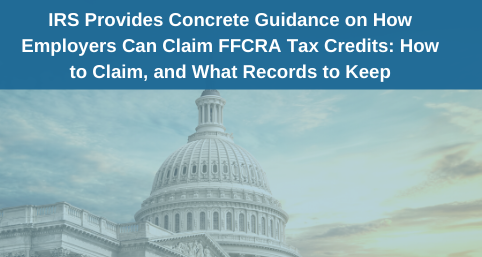
The IRS published some much anticipated (and much needed) concrete guidance for employers, providing detail on how to be reimbursed for the costs of Families First Coronavirus Response Act (“FFCRA”) paid leave through payroll tax credits. In COVID-19-Related Tax Credits for Required Paid Leave Provided by Small and Midsize Businesses FAQs, available on the IRS website, the IRS answered a long list of frequently asked questions in (relatively) plain English. Topics include:
In this alert, we focus on (1) how to claim the credits and (2) what documentation and records to collect and retain.
Assuming an employer is eligible, that employer will use their quarterly employment tax return (typically Form 941) to report their total qualified leave wages (i.e., the amount actually paid out for qualified leave) and the related tax credits.
However, employers don’t need to wait until the credit is claimed and processed to have the cash to fund their leave obligations. Employers already withhold and collect certain amounts from employees, like income tax withholding and Medicare taxes, that employers would normally then pay over to the IRS. In anticipation of getting a tax credit, an employer can spend such amounts to pay for paid leave obligations instead of paying those amounts over to the IRS. Any withheld federal employment taxes that are in excess of the amounts used to pay for paid leave obligations should still be deposited with the IRS. Employers will generally not be subject to a penalty for not paying the full amount of withheld federal employment taxes to the IRS.
If an employer doesn’t have sufficient withheld federal employment taxes to cover the cost of leave, that employer can request an advance using Form 7200, Advance Payment of Employer Credits Due to COVID-19. However, the employer should first reduce the amount of withheld federal employment taxes in its possession (i.e., that has not already been paid to the IRS) to zero.
Employers should be sure to collect certain information in order to substantiate eligibility for the credits.
When Leave Is First Requested
In order to substantiate eligibility for the leave-related tax credits, employers should require employees to provide a written request for leave that includes:
In the case of a leave request based on a quarantine order or self-quarantine advice, the statement from the employee should include the name of the governmental entity ordering quarantine or the name of the health care professional advising self-quarantine, and, if the person subject to quarantine or advised to self-quarantine is not the employee, that person’s name and relation to the employee.
In the case of a leave request based on a school closing or child care provider unavailability, the statement from the employee should include the name and age of the child (or children) to be cared for, the name of the school that has closed or place of care that is unavailable, and a representation that no other person will be providing care for the child during the period for which the employee is receiving family medical leave and, with respect to the employee’s inability to work or telework because of a need to provide care for a child older than fourteen during daylight hours, a statement that special circumstances exist requiring the employee to provide care.
As Employees Are on Leave and Afterwards
In addition, employers should create and retain records reflecting:
How Long to Keep Records
All records relating to employment taxes, including the tax credits, should be retained for at least four (4) years after the date the tax becomes due or is paid (whichever is later), and the records should be kept in a manner such that they are available for IRS review.
For questions about this and other COVID-19 tax developments, please contact TJ Wilkinson or Bob Canter at Shulman Rogers.
The contents of this Alert are for informational purposes only and do not constitute legal advice. If you have any questions about this Alert, please contact the Shulman Rogers attorney with whom you regularly work or a member of the Shulman Rogers Tax Group.
Stay up to date with all the latest news and events.